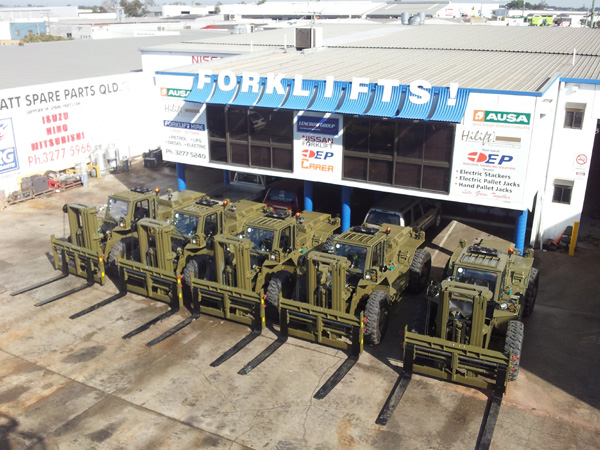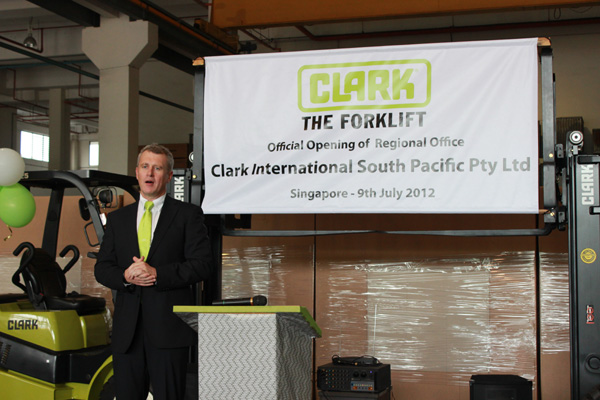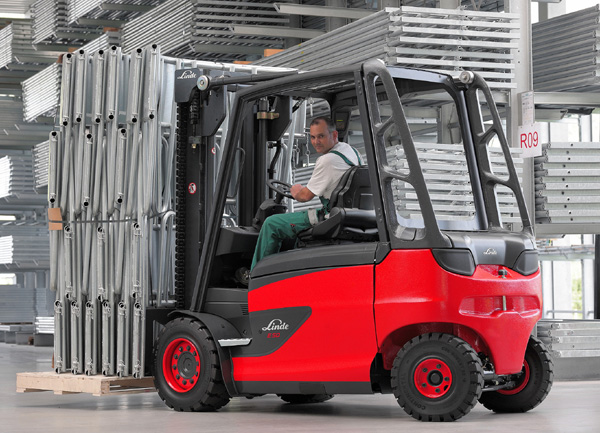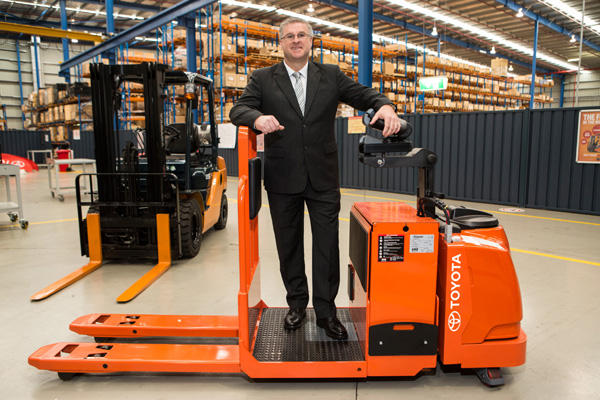 Five of the forklifts delivered to the RAAF from Lencrow in Queensland. |
Most of the players in Australia's forklift industry experienced steady growth in 2012 and remain cautiously optimistic for the year ahead, but as
Karen Harverson reports, they predict a tightening of conditions in 2013 as some businesses adopt a 'wait and see' attitude to capital expenditure.
This mirrors the findings of the latest CPA Australia Asia Pacific small business survey which reports Australian small businesses adopting a 'holding pattern' mode amidst falling confidence about the prevailing economic climate.
One of Australia's largest independent forklift suppliers, Lencrow Group Materials Handling, says 2012 was an excellent year. "Lencrow had a wonderful year despite the gloom and doom of our economists," says managing director Ross Grassick.
He tells
Forkliftaction.com News that the company completed and delivered 12 air-transportable rough-terrain forklifts to the RAAF as well as enjoying growth across all areas including sales, hire and service.
He says the company has increased its forklift transporter fleet (tilt trays and floats) by four units, totalling 10 in all. "This has been due to both growth and to improve our customer service."
He adds that 2012 also resulted in the company offering The Easy Range of materials handling equipment designed for small businesses. "All the units are pedestrian, requiring no licence, and come from more than one source and (are) available from one location, making the choice and after-sales support less stressful."
Looking to 2013, Grassick sees a slowing in the industry until the federal election is finalised. And regardless of the winner, he urges government to reflect on current tax changes which he believes will cause many large companies to withhold spending in the first quarter of 2013.
He says the industry needs to consolidate as too many brands are being sold, some supported and others not.
Commenting on the challenges facing the forklift industry, Grassick says WHS compliance is still an issue, along with the problem of non-compliant and unsupported products being imported into Australia. "Many customers buy products that are substantially orphans and they do not find this out until they require parts. I feel that companies should be required to support a product for a number of years after the sale."
He says this year's lower interest rates have given long-term hirers the best advantage in the last half of 2012, "and I feel this will flow into 2013 as the cost of money plays a large part in hire rates".
On the carbon tax, Grassick believes the effect will only be fully understood by mid-2013 but says the concern over the tax, along with the uncertain economic climate, is putting a brake on confidence. "We have many quotes out just waiting for someone to have the confidence to give us the order."
 Clark CEO Robert Hammond at the opening of the company's regional office in Singapore. |
Also celebrating a great year in 2012 is Clark Equipment which experienced 26% growth in its forklift division. CEO Robert Hammond tells
Forkliftaction.com News that 2012 was "an enormous year for Clark".
He adds that one of the biggest highlights was the opening of its regional office in Singapore and the appointment of dealers in Singapore, Malaysia, Thailand, Sri Lanka and other Asian countries.
Looking ahead, Hammond believes 2013 will be a tight year. "We have already seen the market slide in the second half of 2012 and (there is) the likelihood of difficult trading conditions in the first half of 2013 - at least until the political uncertainty of a new election gets resolved."
He says many sectors such as manufacturing, construction, and retail are under real pressure and now mining looks as if it is slowing. "The forklift industry is a barometer of general economic activity, so we can expect a tight year."
Hammond says falling confidence is one of the main issues confronting business. "New taxes, IR changes affecting productivity, spiralling energy costs, increasing compliance costs and the high cost of doing business (have) made Australia a difficult country (in which) to operate a business."
He adds that these issues need to be addressed and the government needs to gain the trust of business before conditions will improve.
On the challenges facing the industry, Hammond says materials handling needs to be able to adapt to the new business environment. "Flexibility with funding and contractual arrangements for customers are key," he adds.
He believes the carbon tax will put up the costs of all businesses. The size of the impact is still to be felt, says Hammond, "and, indeed, we may not know the full damage for a generation when industries suffer from lack of new investment".
He adds that those affected will have to look at opportunities to innovate and companies such as Clark will have to work with them to take advantage of productivity improvements or new technologies to offset the increased cost of doing business.
He does not believe the lower interest rates seen in 2012 have affected equipment purchasing. "This is evidenced by the continuing trend towards rental and the slowing of the market in the second half of the year despite interest rates coming off."
On the effect of new brands entering the market, Hammond is pragmatic. "The new brands have definitely increased competition in the value end of the market. However, I think in doing so they have focused customers' attention on the critical areas of whole of life cost, productivity and reliability. Low cost does not always represent value."
 Linde Australia saw profitable market share growth in 2012. |
Linde Australia, the local arm of Europe's materials handling equipment powerhouse, saw profitable marketshare growth in 2012. Managing director Carl Smith says highlights include:
* Major development in the IC marketshare;
* Securing major contracts with some of Australia's largest organisations; and
* The appointment of new dealers in key regional areas.
He says 2013 will be another year of growth for the industry. "However, I also believe that the (materials handling equipment) purchaser is focused today more on the need for longevity, product and service sustainability and not just motivated by price. This will test some of the equipment organisations we have in Australia."
Smith tells
Forkliftaction.com News that some of the major issues for the industry are the low value/poor quality brand market development from the Asian market, which he says, forces quality brands to devalue their product offering.
"As an industry, we need to retain our professionalism and high standards and continue to focus on adding value to the market."
On the carbon tax, Smith believes it will have little impact on the company. If anything, I see it helping based on the technology and design of the Linde product which benefits our clients."
 TMHA's Steve Takacs says generating sufficient skilled labour to meet demand is one of the major issues confronting the materials handling industry. |
Forklift giant Toyota Material Handling Australia (TMHA) saw continued growth in 2012, with the successful opening of new branches in Albury and Gladstone adding to its extensive branch network.
Steve Takacs, executive vice president and COO, tells
Forkliftaction.com News that 2013 will see a consolidation of suppliers along with a flat market.
He urges government to focus on stimulating industry and working with business to increase Australia's competitiveness in export markets, particularly in South East Asia. "Generally, this will improve the overall economic conditions."
He says generating sufficient skilled labour to meet demand is one of the major issues confronting the materials handling industry.
On the effect of lower interest rates in 2012, Takacs says: "Australian businesses have been notoriously tight-fisted when it comes to capital expenditure, and lower interest rates have done little to arrest this trend. We expect retail conditions to remain similar next year."